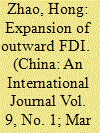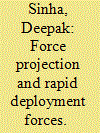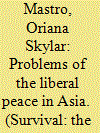| Srl | Item |
| 1 |
ID:
103495


|
|
|
|
|
| Summary/Abstract |
The last two decades have witnessed a significant rise and expansion in outward foreign direct investment (OFDI) from China and India. This paper discusses the development process of China's and India's OFDI since the early 1980s, analysing the major driving factors and determinants behind their enterprises' "going out" strategies, and comparing the different structures of their OFDI. The main conclusion is that the OFDI from China and India is likely to expand further in the future as the two giants aspire to become significant regional and global players in their respective industries.
|
|
|
|
|
|
|
|
|
|
|
|
|
|
|
|
| 2 |
ID:
130094


|
|
|
|
|
| Publication |
2014.
|
| Summary/Abstract |
As India's regional and global aspirations grow with its increasing economic clout, it will be forced to build up its capacity to project power in its national interest to ensure that the region is not destabilized by outside elements that may be inimical to it. The establishment of an effective and responsive RDF towards this end is inescapable. To be able to do so requires that India take a long hard look at its requirements and reassess its capabilities. It needs to quickly put in place structures that will ensure that its RDF is able to provide what is required at it so that in the words at Rahul Gandhi, "We stop being scared about how the world will impact us, and we step out and worry about how we will impact the world."
|
|
|
|
|
|
|
|
|
|
|
|
|
|
|
|
| 3 |
ID:
128847


|
|
|
|
|
| Publication |
2014.
|
| Summary/Abstract |
The conviction that economic ties will engender peace is a lynchpin of US strategy, but Asian leaders view failure to protect territorial claims as worse than the losses associated with a limited war. The conviction that economic ties will engender peace in Asia has been a lynchpin of the US strategic response to a rising China for over two decades. When the US-China Relations Act of 2000 passed under President Bill Clinton, proponents of the measure argued that increased Sino-American trade would contribute to China's peaceful rise because Beijing would reject revisionism while it benefitted from the US-led world order. As one US senator commented at the time, 'the world will be a safer place - or so we hope, and so history argues'. Later, President George W. Bush described the exchange of 'many handshakes of friendship and commerce' between the American and Chinese people as enhancing understanding and therefore peace. Moreover, many of his closest advisers hoped that Chinese economic growth would eventually result in a rising middle class that would demand political freedoms and compel reform of the one-party Communist system. Most recently, President Barack Obama extolled the benefits of China's growing economic clout, declaring that 'a peaceful and stable and prosperous China is not only good for Chinese but also good for the world and for the United States'.
|
|
|
|
|
|
|
|
|
|
|
|
|
|
|
|